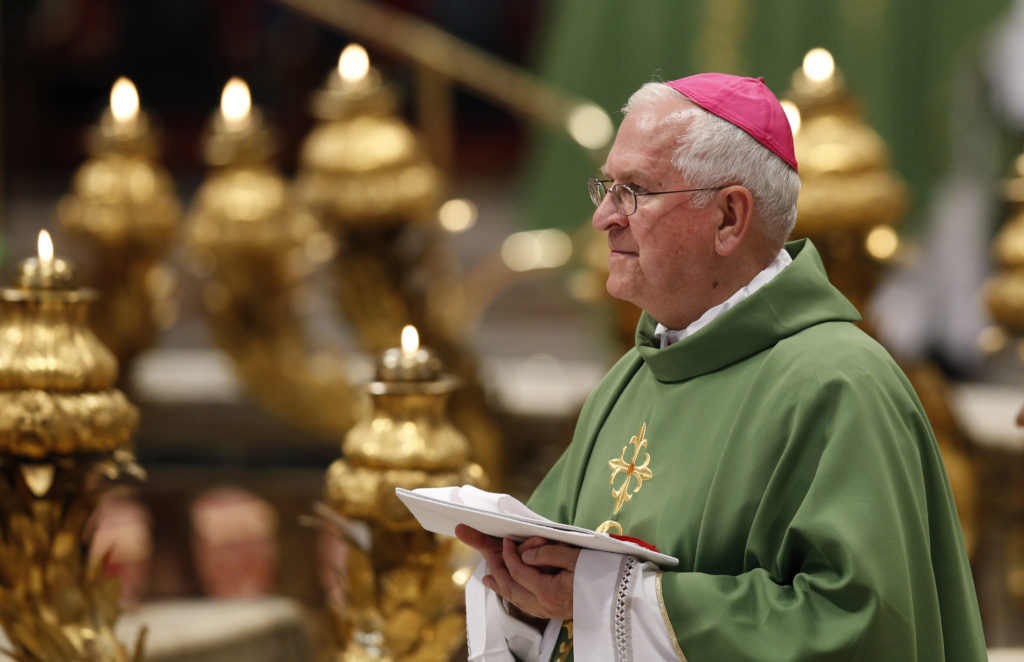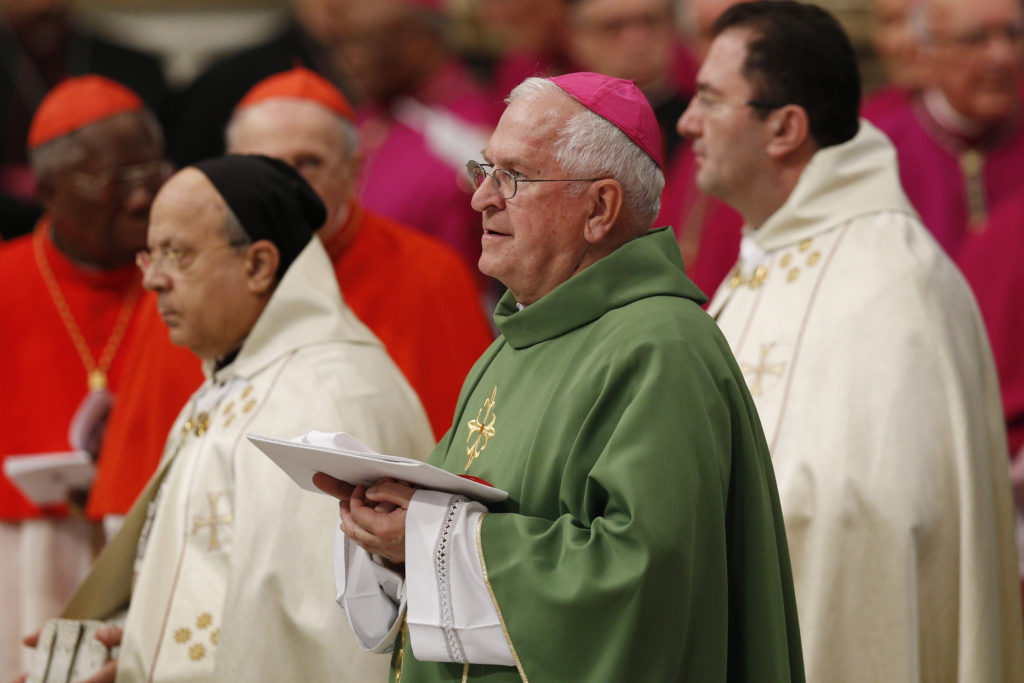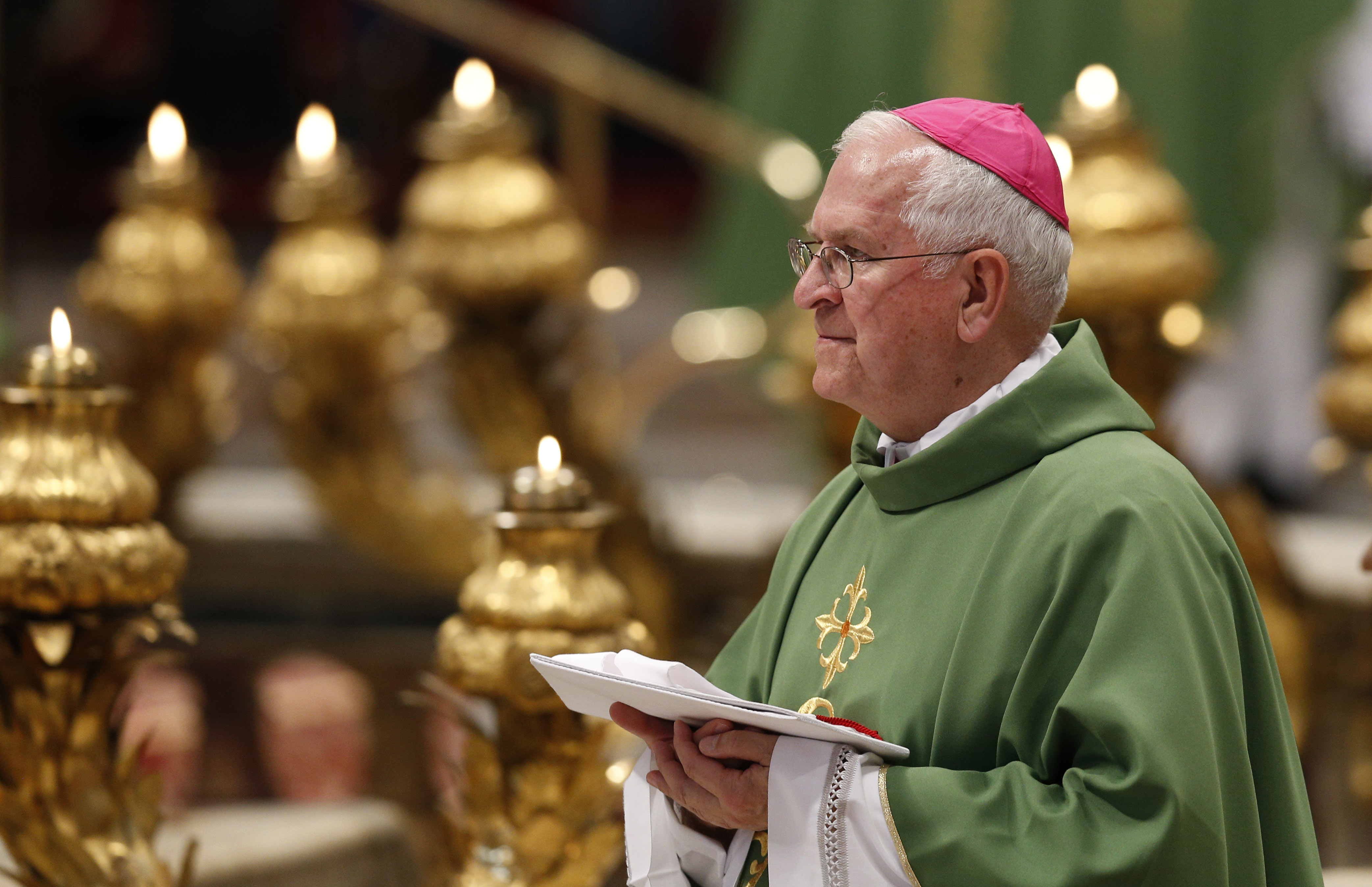
VATICAN CITY (CNS) — The Synod of Bishops on the family must find ways to give Catholic families a leading role in evangelizing and supporting other families, the president of the U.S. Conference of Catholic Bishops told the synod.
“Families who by the grace of God model tenderness, forgiveness and the joy of family life make marriage credible and show that the Gospel of the family is truly good news,” said Archbishop Joseph E. Kurtz of Louisville, Kentucky, USCCB president.
Each voting member of the Synod of Bishops is allowed one formal, three-minute speech to the assembly and to submit fuller remarks or comments on other topics in writing.
Archbishop Kurtz, who was one of the first synod members to address the assembly, released an expanded version of his synod talk Oct. 8.
“As the synod seeks to offer concrete solutions to the many difficulties families face,” he said, “we must enlist the help of the family itself in a very deliberate way and provide families with the formation they need to be active agents of evangelization.”
The synod, the archbishop said, cannot focus only on the challenges the family faces or on “wounded” families; it also must recognize the “incredible vitality and strength” of families.
To prepare a young man for priesthood, dioceses dedicate years’ worth of resources to his education and they ensure continuing education throughout his years of ministry, he noted. If Christian families are to fulfill their role as missionaries, dioceses and parishes must make a commitment to their training as well.
On a practical level, he said, it would be important to have “small groups of families who encourage each other in the ups and downs of family life and strong connections” between parishes and families.
But to be effective, Archbishop Kurtz said, church leaders and the families themselves must believe and trust in God’s promises and in the grace that is given through the sacrament of marriage, he said.
“The Holy Spirit penetrates the life of the spouses who are consecrated and equipped for their mission,” he said. “We must trust in God’s grace as we help Christian husbands and wives embrace and live the truth of the sacrament they have received.”

In one of Pope Francis’ weekly reflections on marriage and the family leading up to the synod on the family, he spoke of the need “to give back a leading role to the family that listens to the word of God and puts it into practice” (Sept. 2, 2015). This theme — of giving leadership to the family – is also raised in the working document for the synod, which described the family as “an essential agent in the work of evangelization” and as having a “missionary identity” (“Instrumentum Laboris” 2, 5). I believe that a priority of the church, both at the synod and beyond, must be to call forth the indispensable witness of Christian families, and to form families to live their missionary vocation. In other words, the family should not only receive the church’s pastoral care (though it is essential that proper care be offered), but should also actively participate in the church’s mission. To that end, I propose two considerations.
First, we must trust in and announce anew the powerful, redemptive grace of Jesus Christ. Our way forward must always look to him with confidence. In the sacrament of marriage, Jesus himself abides with Christian spouses. The Holy Spirit penetrates the life of the spouses who are consecrated and equipped for their mission. We must trust in God’s grace as we help Christian husbands and wives embrace and live the truth of the sacrament they have received.
Second, as the synod seeks to offer concrete solutions to the many difficulties families face, we must enlist the help of the family itself in a very deliberate way and provide families with the formation they need to be active agents of evangelization.
We need families who can witness — even through their own wounds and difficulties — to the beauty of marriage and family life. The need for such families was made clear by Pope Francis in his homily at the opening Mass of the synod (Oct. 4, 2015). He pointed out a paradox: People today often ridicule the plan of God for marriage and family, but at the same time they “continue to be attracted and fascinated by every authentic love, by every steadfast love, by every fruitful love, by every faithful and enduring love.” Families who by the grace of God model tenderness, forgiveness and the joy of family life make marriage credible and show that the Gospel of the family is truly good news.
Evangelizing as a family is done in the very midst of family life, “a place where evangelical holiness is lived out in the most ordinary conditions” (Pope Francis, address at prayer vigil for the synod, Oct. 3, 2015). Missionary families reach out to others. They can participate in the church’s mission as a field hospital, described beautifully by Pope Francis as: “doors wide open to whoever knocks in search of help and support … to reach out to others with true love, to walk with our fellow men and women who suffer” (homily, Oct. 4, 2015).
How do we promote this compelling vision of missionary families? Solid formation and support for families are essential. Just as the local church invests years of effort into future priests’ education and preparation for ministry, so, too, must we offer intentional and ongoing formation so that the family can truly live its missionary identity. Important here would be small groups of families who encourage each other in the ups and downs of family life and strong connections between the church in the parish and the church in the home (the domestic church).
Moving forward, I also believe the way we speak is important. We must not speak only “about” the family, but also “to and with” the family. We must “learn from the family, readily acknowledging its dignity, its strength and its value, despite all its problems and difficulties” (Pope Francis, address at prayer vigil, Oct. 3, 2015). Families face challenges and are wounded, yes, but they also possess incredible vitality and strength.
In sum, my hope is that the synod takes up and furthers the vision of families as active agents of evangelization and missionaries, especially to other families. Even more, I hope that one fruit of the synod is increased attention to calling forth, forming and supporting families in their missionary vocation. Let us give back a leading role to the Christian family. In Christ is our confidence.







